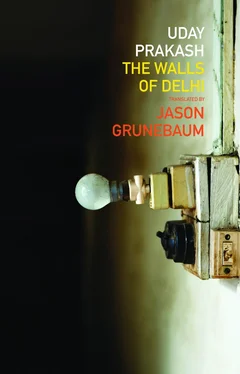‘The mahua’s flooded his brain. Mix jeera and ajwain with yogurt and spoon it in his mouth!’ Biran Baiga advised.
Kasturi mixed the jeera and ajwain in a little cup and brought it over to Mohandas; Gopaldas took Mohandas’s head in his lap. Mohandas’s eyes and mouth opened, and he regarded the two as if he had no idea who they were. In a weak and barely audible voice he asked Kasturi, ‘Who are you, sister? And who am I, tell me!’ He then smiled at Kasturi and began humming:
Hey Bilaspur lovely
I’m a Raigarh lad
Don’t you think we’re made for each other?
This was too much for Kasturi, and she began to break down. Sharda also began to cry at her father’s condition. Gopaldas patted Kasturi on the shoulder, took the little cup from her hand and told Mohandas, ‘Here, take your medicine.’
Mohandas looked at him sheepishly, as if he himself were a little child, drew the cup to his mouth, and drank it in one gulp. Maybe somewhere in his mind stirred the wish to get better. Kasturi and Gopaldas were relieved; maybe it would make a difference — otherwise, they’d have to call the doctor.
Mohandas fell back asleep.
Mohandas slept in the same spot in the same corner of his house for five days and four nights nonstop. The word had spread in the village that he’d completely lost his mind and he didn’t recognise a soul anymore, not even his wife and kids. Some had it that the mahua he’d drunk had been diluted with urea, while others insisted that his summer-heat-induced faint at the Oriental Coal Mines that day had erased his memory. Vijay Tiwari spread a rumour that his spotted dog had bitten Mohandas by accident, and now you’ll see, as sure as the sun will shine, Mohandas will start barking like a doggie. Everyone had his own rumour. It was tough for Devdas and Sharda; they went to school and were asked by the teacher and kids, Is your papa a loony toon? Does he even know who you are anymore? Is it true he only sleeps and sleeps — and if so, how does he bathe and pee and poo?
A rumour even spread that one night Mohandas got up in the middle of the night, grabbed his father’s machete, and ran around trying to slash and kill everyone in the house. Kasturi tackled him and blind old Putlibai tied him up with a rope, otherwise god knows what might have happened!
(All of this was happening at exactly the same time as when the ‘India Shines’ campaign was in full force, and the finance minister and World Bank promised that as long as the five point eight per cent rate of economic growth that started in 1990 continued for the same number of years, India would become the United States, given the fact that the US became the US in fifty years with half that rate of growth.
…it was the time when I was diagnosed with bone tuberculosis, two of my lumbar discs in a state of advanced degeneration. I was confined to bed for nine months and the smiling heads of the Buddhas carved from the Bamiyan mountains in Kandahar were being destroyed by rocket fired missiles…
…it was the time when four years’ worth of the sweat of destitute workers, nineteen thousand tons of steel, and four hundred and fifty seven thousand cubic metres of earth were moved during the construction of Asia’s biggest, and the world’s most expensive and modern, metro rail system… At the time when the houses and homes and fields and yards of more than fifty million adivasis and dalits and aboriginals were submerged under water for the construction of thirty five hundred dams… At the time when twenty million people living in India didn’t have drinking water… and seven hundred million didn’t have a place to wash, bathe, piss, or shit.
…it was the time when the parties in the Left coalition raised hell in the streets of Delhi to protest against a rise in gas prices, when some ninety percent — nine hundred and twenty million Indians — never bought a drop of gas in their lives…
…it was the time when the police fired on and killed a dozen starving farmers in Ganganagar and Tonk in Rajasthan because they’d thrown rocks demanding water to irrigate their withering crops…
…it was the time when Abdul Karim Telgi ran a counterfeit postage stamp operation worth billions of rupees, with several high-ranking politicians and officials working in cahoots. It was the time when an elderly critic of Hindi letters proclaimed that a bureaucrat-turned-writer was the new Muktibodh, and a second old corrupt critic insisted that some paper pusher was Premchand and Phanishvarnath Renu reincarnate and rolled into one. It was the time when the atom bomb blew up at Pokhran and the Goodwill Bus was running between India and Pakistan after the Kargil war.
And it was the time when the waters of the Kathina river were exacting revenge in Purbanra for the paper mill and the rotting wood at the dam by inundating the land where Mohandas had planted his cucumbers and watermelon and honeydew…
The land where Mohandas, crying ‘hu tu tu!’ had played with Kasturi in the strong current of the Kathina, the memory of their hot passion under the glow of the starry night was the birth, nine months later, of Sharda…)
The truth was that Mohandas wasn’t crazy, and nothing was wrong with his memory. The blow to his psyche had silently festered during the week of unbroken sleep, stupor, and drunkenness. When he awoke, he was again the same Mohandas: a person who knew full well that he and only he was the real Mohandas, son of Kaba, resident of Purbanra, district Anuppur, Madhya Pradesh, who had, some ten years ago, earned a BA from M.G. Degree College, and was second in his class. He was the Mohandas who’d been denied a job because he had no connections, no pull, and no money to use for bribes. He wasn’t a member of any gang or group or mafia because he didn’t belong to a caste that had any power. He knew full well that he and countless others like him had been cheated and lied to and tricked for many, many years, but he had no means to do anything about it.
And one other thing that he knew full well was that Bisnath from Bichiya Tola, son of Nagendranath, who’d assumed the guise of Mohandas Vishwakarma, son of Kabadas, and who was pulling in ten thousand a month as a depot supervisor at the Oriental Coal Mines, was in no way, shape, or form Mohandas. No, he was a soulless bastard, a dyed-in-the-wool caste fascist, and a fraud who wielded so much power that Mohandas, compared to him, was nothing more than a sick, whimpering little mouse.
Mohandas knew that his father — the real Kabadas — had died of TB, after coughing up bloody phlegm while making bamboo baskets, mats, and winnows; but he didn’t have the capability to prove this, since Bisnath’s father Nagendranath was still living as Kabadas in Lenin Nagar and Bichiya Tola — and he was the one who had the papers to prove it.
Mohandas’s silence grew every day. The dam on the Kathina had taken away one of his livelihoods, so he began working at Imran’s Star Computer Centre as a typist, and making printouts and copies. His son Devdas began working at the roadside Durga Auto Repairing Works, helping repair flat tires and fix whatever car problems he could with a screwdriver and wrench. He made one or two hundred rupees a month, enough to cover his school costs. It’d been two years since Sharda had quit working as a nanny for Bisnath’s kids and doing their household chores; Renukadevi had gone to Lenin Nagar to live with her husband. A year ago, Sharda got work in town at the Aishwarya Beauty Parlor. Shikha Madam was crazy about Sharda and helped her out with school. She said, ‘Sharda, one day you’ll become a model and then Miss World and you’ll be on TV!’ Sharda, who was eight, dreamed every night that this would come true.
Kasturi kept an eye on people’s crops in addition to working in the fields of neighbours and villagers. Putlibai’s knees had turned to stone after Kabadas’s death, and she could no longer walk. In order to relieve herself, she had to crawl on all fours out back, and then come back to her corner where she sat on her burlap-like mat. Her blindness had grown even more severe.
Читать дальше










